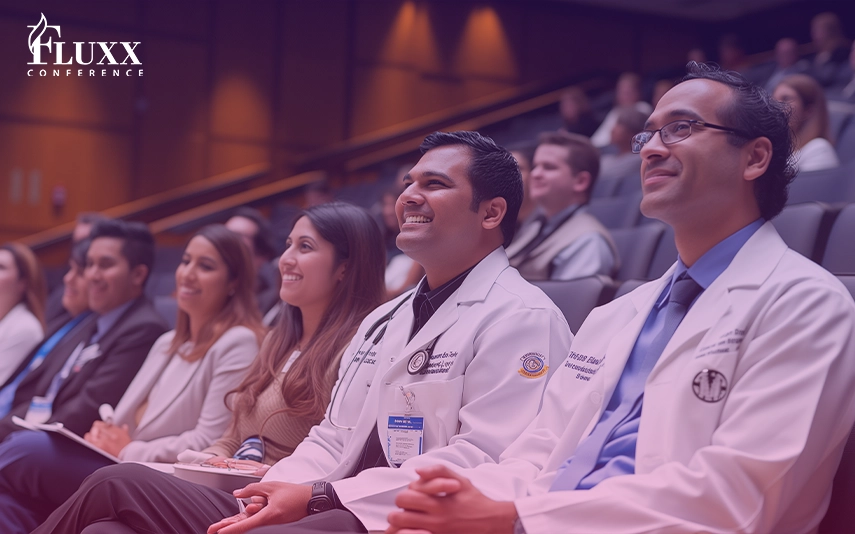
10 Common Mistakes to Avoid at Business & Healthcare Conferences
Attending business and healthcare conferences offers valuable learning, networking, and growth opportunities. Preparation is key, whether you’re diving into industry trends, exploring educational conferences in 2025, or engaging in panel discussions. Avoiding common pitfalls can make your experience more impactful.
Here are 10 mistakes to watch out for when attending conferences:
1. Skipping the Conference Agenda
The oversight of reviewing the conference agenda proves to be an apparent error. The conference document provides relevant information about essential presentations, speakers, and networking opportunities. Review the conference schedule before your visit to develop a suitable plan. Developing a plan enables participants to achieve the most value from their event attendance. The inadequate preparation of a plan leads to crucial session loss, which could yield critical industry insights such as those presented at educational conferences in 2025.
2. Failing to Research Speakers and Attendees
Networking proves ineffective when you show up without studying the essential speakers and important event participants. Devote time to researching the past work of conference speakers and their upcoming presentations. Visitors at healthcare tech conference need to prepare themselves with information about what new developments and tendencies will be featured at the event. Learn about the names of attendees who plan to participate in the event.
3. Overpacking or Underpacking
Taking the right amount of conference supplies requires careful measurement. Neglecting to bring fundamental items such as business cards, chargers, and note-taking materials will force you to search desperately for replacements. An excessive amount of materials for a conference becomes an unnecessary weight on your shoulders. A well-designed lightweight professional bag allows you to transport your essential meeting materials smoothly between activities at the conference.
4. Ignoring Breakout Sessions
Mainstage programs draw the most attention, yet the special sessions produce exclusive knowledge points. These events host detailed examinations about distinct subject areas, such as medical technology, at healthcare conferences. Resist the urge to avoid these short sessions because they deliver detailed information that matches your specific needs.
5. Not Following Up After the Event
Most people abandon the conference immediately after the closing event. After an event wraps up, your established relationships carry on into perpetuity. After conferences, maintain contact with all individuals you encountered during the event through speakers, panelists, and attendees. Connecting with others works best when executed during the initial phase of the experience so relationships will take root.
6. Using a Generic Elevator Pitch
A conference requires you to use your elevator pitch effectively for networking purposes. People tend to shift away from generic or overly practiced pitch statements. Research shows that every networking introduction needs to be tailored specifically for the audience type. At the 2025 Educational Conference, explain your connection to upcoming educational trends and your focus on acquiring new industry strategies.
7. Attending Without a Clear Goal
The absence of predefined goals while attending a conference typically results in the unfortunate loss of essential opportunities. Your objectives determine which targets you focus on in the conference, whether you need clients, new technologies, or industry benchmarks. Set specific targets that will guide your conference attendance. Your conference attendance focuses on technology innovations in healthcare or partner business relations. Your established goal guides you in choosing precisely which conference activities you will join and which professionals you want to connect with.
8. Being Passive During Sessions
Active participation is crucial for every session rather than letting the material pass without a response. At healthcare tech conferences, ask intelligent queries about the current technologies being explored or voluntarily communicate your insights. Your enthusiasm and verbal involvement let speakers understand you are deeply focused on the lecture material. Active participation in conference content is the strongest method to obtain valuable learning during an event.
9. Neglecting Social Media Engagement
The digital era makes social media engagement essential for anyone attending a conference. Nonparticipation with social media at such events represents an avoidable waste of opportunity. Several conferences maintain official social media platforms through hashtags and online communities that let participants share essential insights and initiate discussions. The event provides perfect opportunities to establish connections with presenters and other guests attending the gathering.
10. Not Exploring Tech Showcases and Demos
Attendees should never skip vendor showcases and product demos at healthcare tech conferences. These exhibition areas commonly feature cutting-edge innovations presenting solutions that will define industry evolution. The booths display upcoming technology, allowing visitors to observe its functionality, learn about product specifications, and learn about possible business improvements.
Conclusion
Conferences in 2025 are shaping up to be more immersive, informative, and focused on emerging trends. Whether you’re attending a healthcare tech conference or a broader educational conference 2025, staying prepared and avoiding these common mistakes can enhance your experience. Being proactive, planning ahead, and taking the time to engage with speakers and fellow attendees can lead to valuable takeaways and new opportunities. Don’t let these 10 common mistakes hold you back, make your next conference experience a game-changer.
Stay ahead of the curve, join Fluxx Conference 2025 and connect with industry leaders today!




